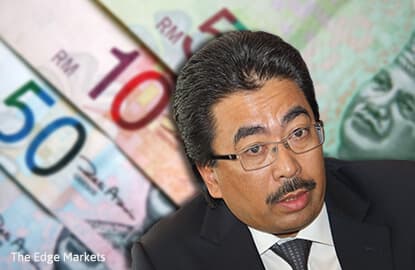
KUALA LUMPUR (Nov 15): The long term price of the ringgit should be 3.80 against the dollar, Second Minister of Finance Datuk Johari bin Abdul Ghani said today.
"The most important thing [is that] Bank Negara Malaysia is very focused on orderly foreign exchange in our country," he told reporters, following his speech at the Malaysian Institute of Accountants (MIA) International Accountants Conference 2016.
"We are an open economy," Johari said.
"There's no such thing as going for capital controls; there's no such thing as pegging — that is the assurance that the Ministry of Finance and Bank Negara will give," he said.
"If you look at why the ringgit is declining now, it's because of a lot of speculative activity offshore," Johari said.
"We are not the only ones affected," Johari added, referring to the outflow of funds in Asian economies such as Korea, Taiwan, Indonesia and Philippines, due to projections that the U.S. interest rate will be hiked at a faster pace.
"As far as Malaysia is concerned, our fundamentals are solid," Johari said, referring to recently-announced 4.3% GDP growth in 3Q.
"What we need to do is to put our focus on developing the economy and putting all the right measures to make sure the economy grows. Once you do that, I think the currency will automatically come back to the level it's supposed to be,” he said.
On the issue of the rising yields of Malaysian Government Securities (MGS), of which about 50% are held by foreign investors, Johari said investors of MGS were international pension funds with long term interests in the country, and are not of short term speculative investors.
“Some of these investors have been [investing in MGS] for over 30 years, and they keep investing as they have confidence in our country.
“Whomever who thinks it’s time to exit [from the MGS market], Bank Negara Malaysia will facilitate that,” he added.
Yesterday, the 10-year yield for MGS rose by 29 basis points (bps) to 4.135%, compared with 16bps last Friday.
On the issue of recalibrating the budget based on the fact that Brent crude oil futures traded at US$44 per barrel yesterday, slightly below the government’s assumption of US$45 per barrel when tabling Budget 2017, Johari said it is too early to say.
“We will stick to our US$45 per barrel assumption, if there any changes [to the budget], we will have to wait and see till the first quarter of next year,” he said.